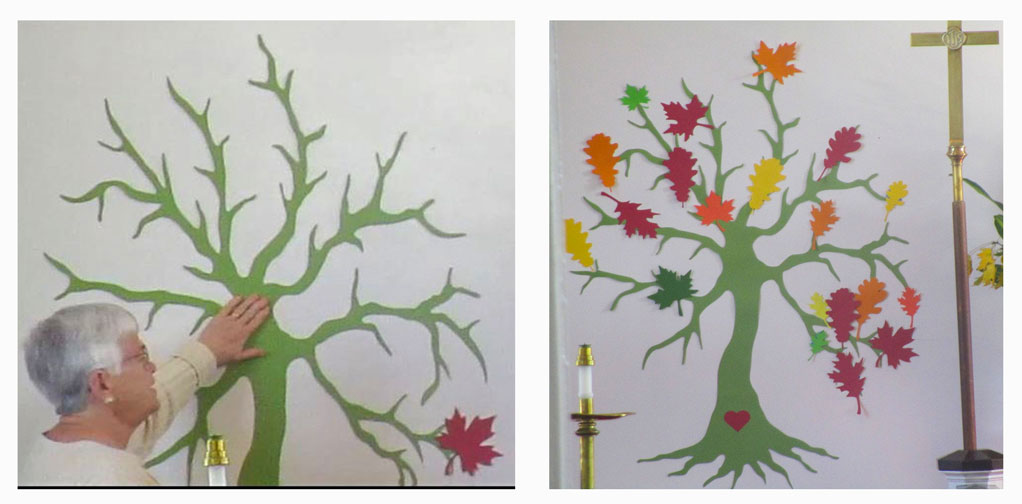This is a topical summary. We have another page that is a chronological listing of 2023 events with table of contents with links to the events.
The highlights can be grouped as follows:
A. New ministry
God’s Garden
Chancellors Village
Advent Worskhop
B. New expressions in ministry
Stewardship tree
Lent -Stations of the Cross in the graveyard and more services
C. Expanded and revised ministries
Mission trip to Jamaica
Anniversary Village Harvest Food Ministry
Sacred Ground revised
ECM (Episcopal Church Men) end of year expanded donations and use of an art auction.
Community – Prayer service, Outside Christmas pageant, Work with community organizations
Key parishioner volunteering
ECW (Episcopal Church Women) projects
D. Music provided new delights
Easter, the summer and Christmas
Blue grass concert
E. Losses connected with two historic trees and two heating systems.
1. New ministry – God’s Garden

A new ministry debuted Sept 17, 2023. God’s Garden for 5 to 9 year olds began with 4 children and two experienced teachers, Elizabeth Heimbach, the originator of the class and Jan Saylor.
One of the first activities was to “God’s Garden” which explored what it meant to be a saint, today (Oct. 1, 2023) for St. Francis Day on Oct. 4. As an example they told the story of St. Francis taming the Wolf of Gubbio. Then, they made Pet blessings with treats to give out in church to make pets happy on St. Francis Day, Oct. 4.
2. Expanded ministry in Jamaica

Even before the mission began, we hosted Annette Steele, principal of Victoria Primary School who enjoyed a full day at St. Peter’s on Sun, Aug. 13. She addressed the church at announcements about our joint mission to help the students in her elementary school get ready for school in Sept, both in 2021 and 2023. She explained how much it meant to the students and her community.
After the service, she enjoyed St. Peter’s hospitality at a luncheon and met our parishioners and guests.
The group of 3 on the mission team distributed our donations in Jamaica on Aug. 26
We not only brought the usual school supplies but added 6 tablets. Separately, 7 used computers were donated to a school that had never had a computer.
There were different ways of distributing the items. There were contests for tablets and food baskets won by answering questions. Certificates given out based on merit overall and in areas like math. A number of students won $1,000 Jamaican dollars for math competency. Teachers were not forgotten – 2 footballs were given out to the coach!
3. Village Harvest ended its 9th year and began its 10th year in August, 2023 and ended the year serving the most people since 2019.

For the year, we recovered from a slow 1st quarter, 2023 and ended the year serving 1,063 people compared to 1,051 in 2022. It was the best yearly total since 2019.
Unfortunately, the same trend overall wasn’t present with food. Food increased from 2021 to 2022 (14,303 to 15,302 pounds) but dipped to 13,859 pounds in 2023. The first quarter was the problem. We had 2,913 pounds in that quarter compared over 4,000 for 2022 and 2021.
As a result, pounds provided per individual dropped from 14.56 in 2022 to 13.04. In 2021, it was in the same range at 14.32. Overall, pounds per individual are substantially higher since 2019 than in earlier periods.
The 2023 collection on Giving Tuesday, Nov 28 of $1,205 was the highest Giving Tuesday figure since 2019 and provides over 5 months of support for purchasing food for 2024
4. Sacred Ground revised their scholarship program

Representatives from Sacred Ground met with Jessica Thompson, Executive Director of the Germanna Educational Foundation, for lunch at Castiglias in Fredericksburg on Oct. 10, 2023. The goal was to determine how we could move forward with a new focus on our scholarships for students.
Sacred Ground voted unanimously by email in early December to fund the recommendation forwarded by Jessica Thompson at Germanna for scholarships for students entering the trades. Each student is “in financial need and from underserved populations.” The $2,700 would be split equally to pay for their training.
Each student owes approximately $1,500 for the classes to complete the training. We will pay for the additional expense for each student through additional scholarship funds
They also toured Patawomeck Village in November. The goal of the visit was to understand their history and culture as well as our role
Earlier, the Sacred Ground group had the pleasure of meeting with Alanna Gray (beside Catherine), and her mother and grandmother (opposite Alanna) at Cuppa Cheer in February
Read more









 to open in a new window
to open in a new window